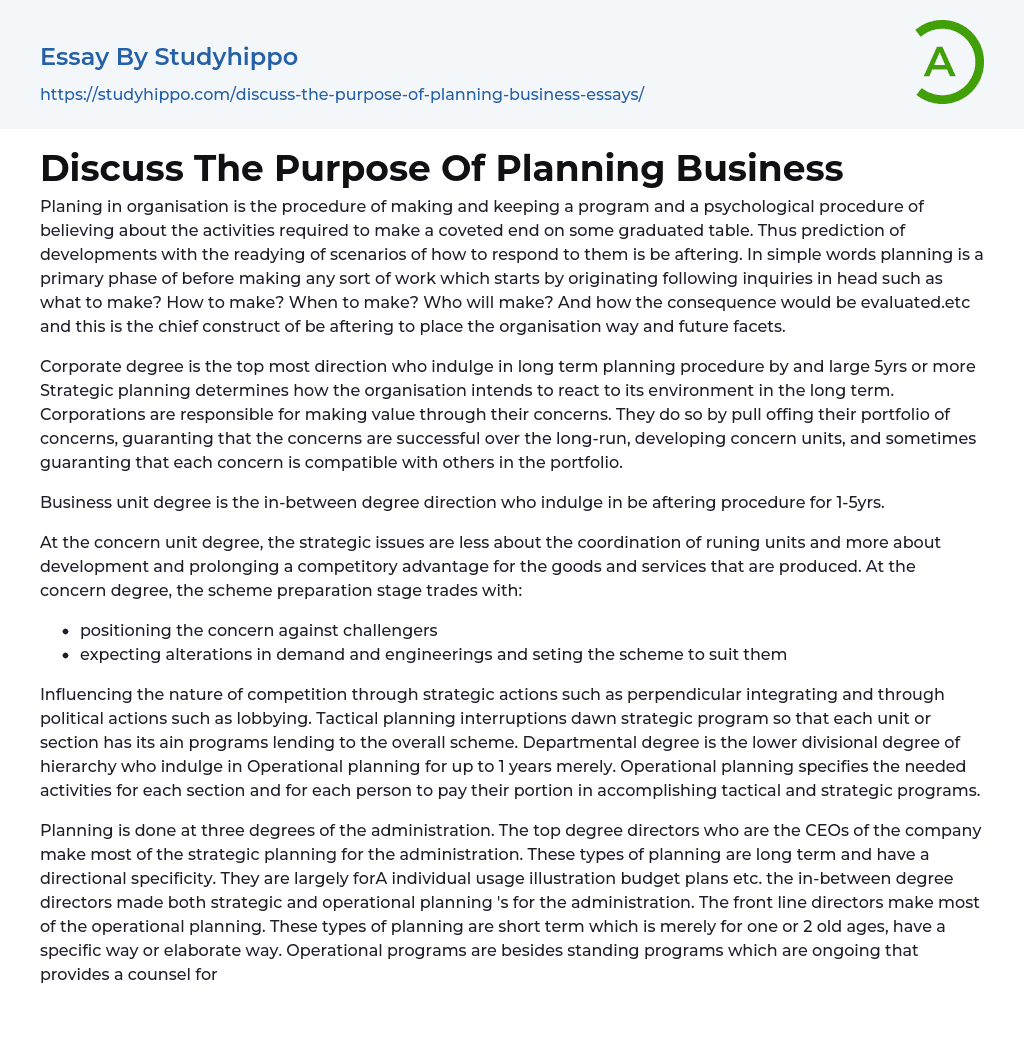Planning in an organization involves the creation and maintenance of a program and a cognitive process of thinking about the necessary steps to achieve a desired goal on a specific scale. This includes making predictions and preparing scenarios to respond accordingly. In simpler terms, planning is the initial phase before commencing any work, which entails considering questions such as what needs to be done, how it should be done, when it should be done, who will do it, and how the outcome will be assessed. This serves as the primary concept behind planning that helps determine the direction and future aspects of an organization. At the corporate level, top management engages in long-term planning that typically spans over five years or more. Strategic planning establishes how an organization will react to its environment in the long run. Corporations are accountable for generating value through their businesses.
The process of portfol
...io management involves managing a range of businesses to ensure their long-term success. This includes developing and aligning business units, as well as ensuring compatibility within the overall portfolio. Business unit management focuses on planning for the next 1-5 years, with strategic issues revolving around competitive advantage and sustainability. At the business level, strategy formulation involves positioning against competitors, anticipating changes in demand and technology, and adjusting strategies accordingly. Additionally, strategic actions like vertical integration and political actions like lobbying can influence competition.
Tactical planning interrupts strategic program so that each unit or section has its own programs contributing to the overall scheme. Departmental level is the lower divisional level of hierarchy, engaging in operational planning for up to 1 year only. Operational planning determines the necessary activitie
for each section and for each person to contribute to achieving tactical and strategic programs. Planning is conducted at three levels of the administration.
The company's top-level directors, who are also the CEOs, primarily engage in strategic planning for the administration. This kind of planning is focused on long-term goals and provides direction. It is mainly used for individual purposes such as budget plans. On the other hand, middle-level directors undertake strategic as well as operational planning for the administration. Finally, front-line directors play a key role in operational planning.
These planning types are short term, typically lasting for one or two years, and are detailed or specific. Operational plans are also ongoing and provide guidance for activities such as policies and procedures. Objective setting is the process of determining specific steps or milestones that allow an organization to achieve a goal. Setting objectives requires a continuous process of research and decision-making.
Understanding oneself and one's team is a crucial starting point in establishing objectives. Setting appropriate objectives is essential for effective performance management. While goals such as increased profits, shareholder value, and customer satisfaction may be commendable, they do not provide managers with specific instructions.
- Accounting essays
- Marketing essays
- Automation essays
- Business Cycle essays
- Business Model essays
- Business Operations essays
- Business Software essays
- Corporate Social Responsibility essays
- Infrastructure essays
- Logistics essays
- Manufacturing essays
- Multinational Corporation essays
- Richard Branson essays
- Small Business essays
- Cooperative essays
- Family Business essays
- Human Resource Management essays
- Sales essays
- Market essays
- Online Shopping essays
- Selling essays
- Strategy essays
- Management essays
- Franchising essays
- Quality Assurance essays
- Business Intelligence essays
- Corporation essays
- Stock essays
- Shopping Mall essays
- Harvard Business School essays
- Harvard university essays
- Trade Union essays
- Cooperation essays
- News Media essays
- Waste essays
- Andrew Carnegie essays
- Inventory essays
- Customer Relationship Management essays
- Structure essays
- Starting a Business essays
- Accounts Receivable essays
- Auditor's Report essays
- Balance Sheet essays
- Costs essays
- Financial Audit essays
- International Financial Reporting Standards essays
- Tax essays
- Accountability essays
- Cash essays
- Principal essays




